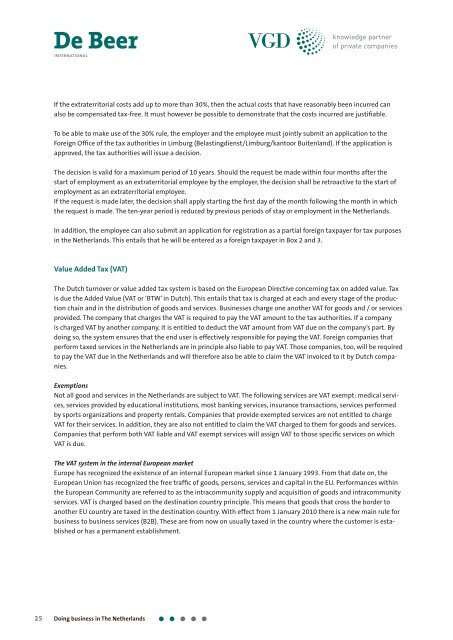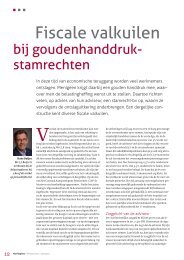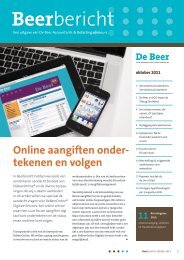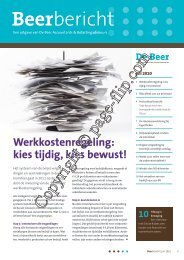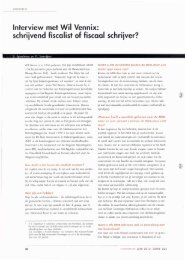De Beer
De Beer
De Beer
- No tags were found...
You also want an ePaper? Increase the reach of your titles
YUMPU automatically turns print PDFs into web optimized ePapers that Google loves.
<strong>De</strong> <strong>Beer</strong>INTERNATIONALknowledge partnerof private companiesIf the extraterritorial costs add up to more than 30%, then the actual costs that have reasonably been incurred canalso be compensated tax-free. It must however be possible to demonstrate that the costs incurred are justifiable.To be able to make use of the 30% rule, the employer and the employee must jointly submit an application to theForeign Office of the tax authorities in Limburg (Belastingdienst/Limburg/kantoor Buitenland). If the application isapproved, the tax authorities will issue a decision.The decision is valid for a maximum period of 10 years. Should the request be made within four months after thestart of employment as an extraterritorial employee by the employer, the decision shall be retroactive to the start ofemployment as an extraterritorial employee.If the request is made later, the decision shall apply starting the first day of the month following the month in whichthe request is made. The ten-year period is reduced by previous periods of stay or employment in the Netherlands.In addition, the employee can also submit an application for registration as a partial foreign taxpayer for tax purposesin the Netherlands. This entails that he will be entered as a foreign taxpayer in Box 2 and 3.Value Added Tax (VAT)The Dutch turnover or value added tax system is based on the European Directive concerning tax on added value. Taxis due the Added Value (VAT or ‘BTW’ in Dutch). This entails that tax is charged at each and every stage of the productionchain and in the distribution of goods and services. Businesses charge one another VAT for goods and / or servicesprovided. The company that charges the VAT is required to pay the VAT amount to the tax authorities. If a companyis charged VAT by another company, it is entitled to deduct the VAT amount from VAT due on the company’s part. Bydoing so, the system ensures that the end user is effectively responsible for paying the VAT. Foreign companies thatperform taxed services in the Netherlands are in principle also liable to pay VAT. Those companies, too, will be requiredto pay the VAT due in the Netherlands and will therefore also be able to claim the VAT invoiced to it by Dutch companies.ExemptionsNot all good and services in the Netherlands are subject to VAT. The following services are VAT exempt: medical services,services provided by educational institutions, most banking services, insurance transactions, services performedby sports organizations and property rentals. Companies that provide exempted services are not entitled to chargeVAT for their services. In addition, they are also not entitled to claim the VAT charged to them for goods and services.Companies that perform both VAT liable and VAT exempt services will assign VAT to those specific services on whichVAT is due.The VAT system in the internal European marketEurope has recognized the existence of an internal European market since 1 January 1993. From that date on, theEuropean Union has recognized the free traffic of goods, persons, services and capital in the EU. Performances withinthe European Community are referred to as the intracommunity supply and acquisition of goods and intracommunityservices. VAT is charged based on the destination country principle. This means that goods that cross the border toanother EU country are taxed in the destination country. With effect from 1 January 2010 there is a new main rule forbusiness to business services (B2B). These are from now on usually taxed in the country where the customer is establishedor has a permanent establishment.25 Doing business in The Netherlands


